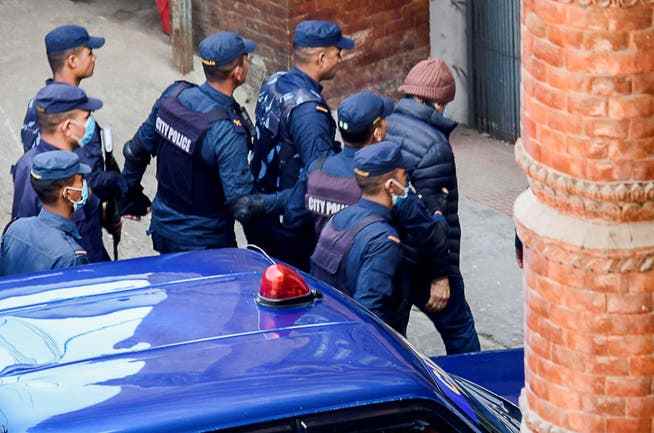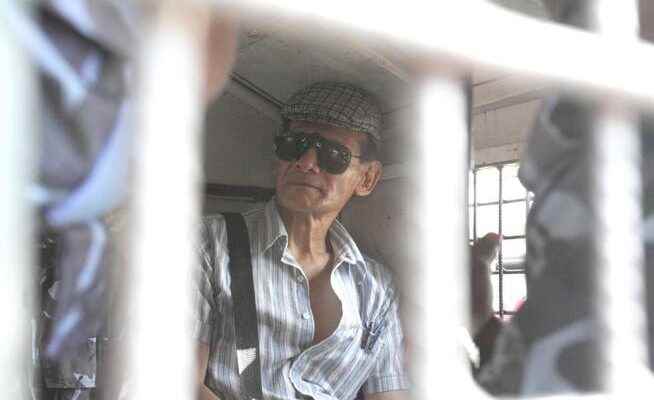The Frenchman gained worldwide fame as the “bikini killer” and “the snake”. For forty years he was imprisoned for several murders in India and Nepal – he only narrowly escaped a death penalty thanks to his calculations.
The peaked cap was his trademark: Charles Sobhraj after a negotiation in Nepal in 2011.
Charles Sobhraj has spent more than half his life behind bars for murder. He robbed and killed a number of western tourists in South and Southeast Asia in the 1970s and 1980s. He was only convicted in three cases. Most recently he was in prison in Nepal. Sobhraj is now allowed to return to his native France.

Charles Sobhraj is taken to the Immigration Department by police officers in Nepal on Friday.
Charles Sobhraj served his first prison sentences as a teenager in France. The petty crimes, however, bore no comparison to what followed when he embarked on a trip to Asia in the 1970s to avoid another arrest. There, the man with Vietnamese and Indian roots soon became known as a ruthless and manipulative fraudster who made his living as a car thief and jewel robber.
The murders were just a means to an end: in order to be able to travel incognito, he used his charming manner to trick tourists into trusting them, then drug them and steal their valuables and identity. Sometimes they were lucky and woke up again after a short time. Some of them died from the drugs themselves or were burned, strangled or beaten to death by Sobhraj.
His actions followed a clear pattern. In Thailand, they dubbed him the bikini killer after several women were found dead on beaches. He also became known as the hippie trail killer because Sobhraj caught western backpackers along the route of the same name, on which adventurous people traveled by hitchhiking or moped from Istanbul, Lahore via Goa to Kathmandu or to Bangkok. Nevertheless, he was able to escape legal consequences several times. The cunning with which he deceived his victims and later especially the authorities earned him his third name: the snake.
He escaped a death penalty by calculation
Sobhraj was convicted of a total of three murders in two countries – although he is believed to be responsible for more than twenty murders in different countries.
He served his first sentence in India from 1976 to 1997 for the murder of a Frenchman. Through bribery and manipulation, however, he was able to negotiate many privileges. This went so far that Sobhraj managed to escape in 1986 after inviting the guards to a tea party and then drugging them with sleeping pills in the biscuits and cakes. After a few days, however, he was arrested again, in the resort of Goa. To this day, a golden statue of Sobhraj with his typical peaked cap commemorates this eventful day.
The outbreak was probably an excuse to extend his imprisonment, which was about to expire. He escaped extradition to Thailand, where he would have faced the death penalty for allegedly killing several women on a beach in Pattaya.
He made a living from his story
Just as cold-bloodedly as he killed his victims, Sobhraj knows how to use his biography: Even in his cell in India, he sold journalists and authors interviews for a lot of money. At the time, he revealed his alleged motive to the Australian author Richard Neville: hatred of Westerners.
After the end of his prison sentence in India, Sobhraj returned to France and lived on the capital that brought him the marketing of his biography. Several books and TV productions have appeared about him. He is said to have received $15 million for the sale of the film rights.
The BBC recently dedicated a mini-series to the serial killer entitled “The Serpent” and thus reached an audience of millions via the Netflix streaming platform. Sobhraj himself only noticed the renewed interest from inside the cell. Because his life in freedom had already come to an abrupt end in 2003 when he traveled to Nepal – despite an open arrest warrant. He was arrested after a journalist spotted him on the street. It is unclear why Sobhraj returned to Nepal at all: you can read that he wanted to trade in mineral water. Or that he risked arrest to bring himself back into the conversation.
He married and had an operation while he was in prison
In Nepal he was sentenced to twenty years in prison in 2004 for the murder of an American woman in 1975, and ten years later for the murder of her Canadian friend. Sobhraj has pleaded innocent in both cases. While he was in the security prison in Kathmandu, Sobhraj married a Nepalese woman who was 40 years his junior and who later represented him in court. In 2017 he also had to undergo a heart operation lasting several hours.

Charles Sobhraj’s wife Nihita Biswas on the day of his release.
His poor health is one of the reasons why the 78-year-old is now allowed to leave prison a year before the end of his sentence. The Nepalese authorities said he started his journey to France on Friday afternoon. He will not be allowed to return to Nepal for ten years. On his release, Sobhraj told dem “Guardians”: «I feel great, I’m flying to Paris», only to add: «My book and a documentary are coming out soon.»
